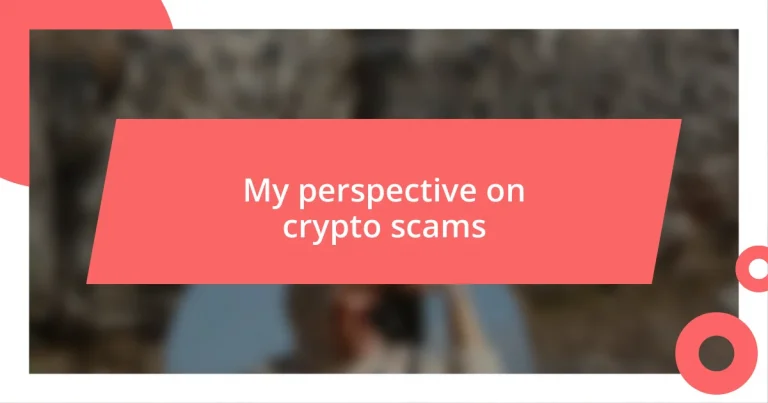Key takeaways:
- Crypto scams exploit emotions like fear of missing out and the desire for quick wealth, targeting even experienced investors through confusion and complexity in the market.
- Common types of scams include phishing scams, Ponzi schemes, and investment scams that often promise unrealistic returns or involve unclear projects.
- Preventing scams involves staying informed, recognizing warning signs, utilizing two-factor authentication, engaging with reputable communities, and reporting suspected scams to multiple channels.
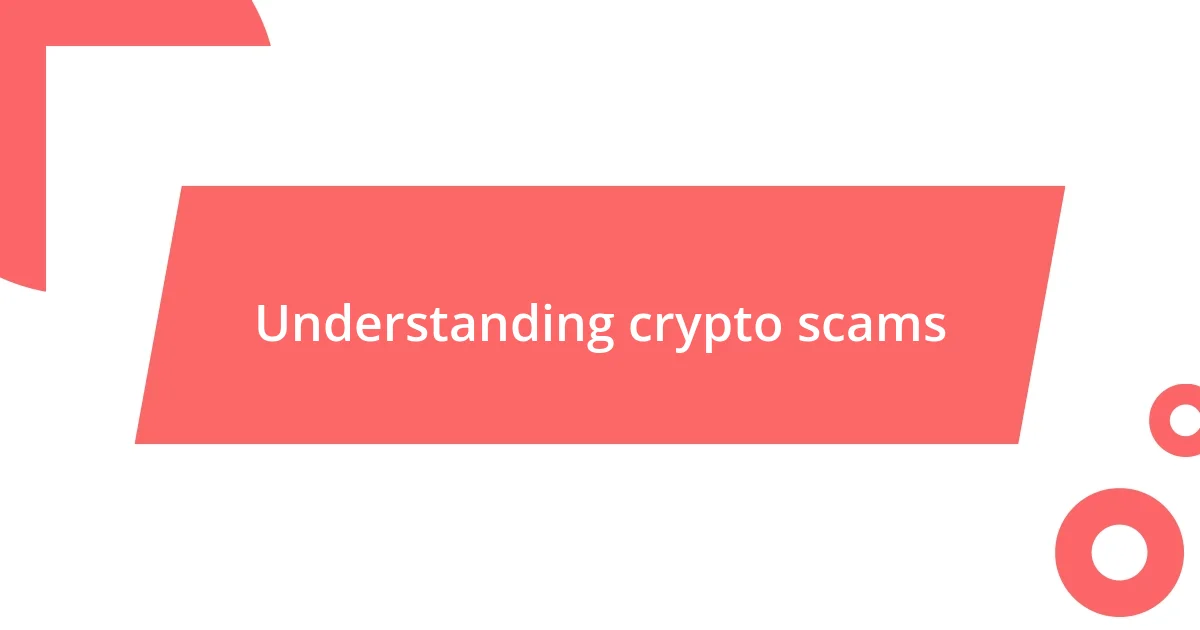
Understanding crypto scams
Crypto scams can take numerous forms, from phishing emails to fake investment schemes. I remember a time when a friend of mine was nearly swept into one of these traps; I felt a wave of frustration as I watched him almost hand over his hard-earned money based on a flashy website that promised unreal returns. It begs the question: how do so many fall for these schemes despite all the warnings?
Examining the psychology behind these scams reveals something truly concerning. Scammers often prey on our emotions, exploiting fear of missing out and promises of easy wealth. I can’t help but empathize with those drawn in; they’re often seeking financial freedom and, in their desperation, overlook the red flags that would typically keep them on guard.
Moreover, I’ve noticed that many scams thrive on the complexity of the crypto world itself. It’s like a maze filled with jargon and technical terms that can easily confuse even seasoned investors. Often, this confusion leads to misplaced trust; I’ve seen individuals invest in projects without fully understanding what they were committing to. How can we combat this sense of uncertainty and equip ourselves with the knowledge to stay safe?
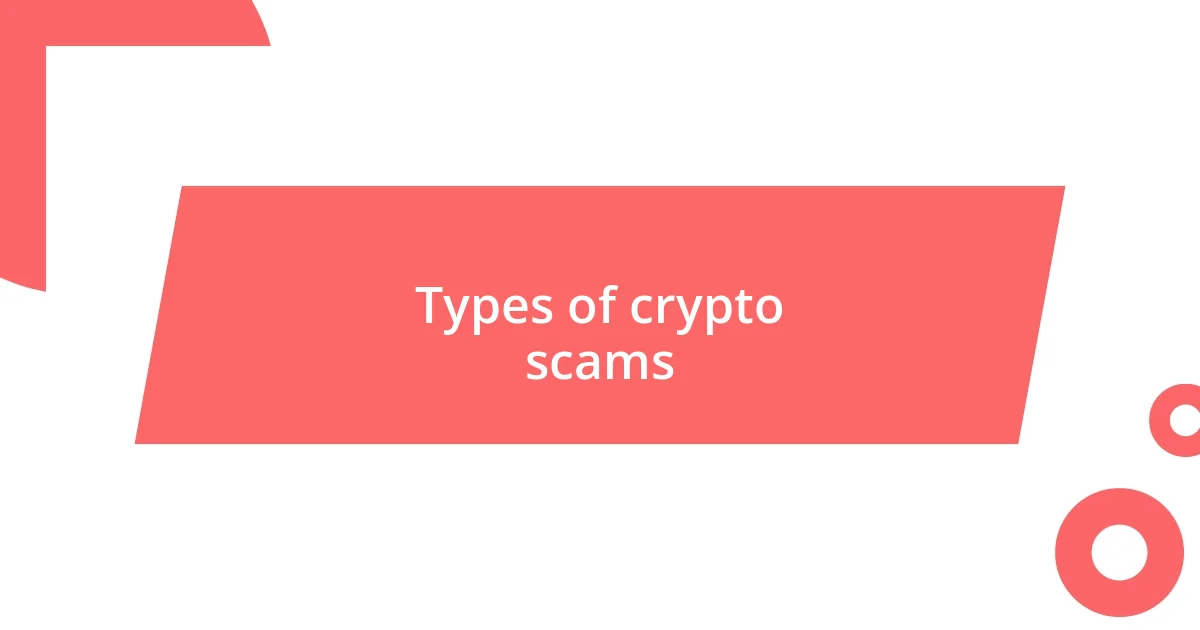
Types of crypto scams
Crypto scams come in various types, each with its own tactics and strategies. One of the most common scams I’ve encountered is the phishing scam, where fraudsters send fake emails that resemble legitimate exchanges or wallets. I remember receiving one myself; it felt unsettling to see my personal information almost snatched away by a cleverly disguised message—an experience that left me extra vigilant about my online security.
In another instance, I’ve witnessed the devastating impact of Ponzi schemes in the crypto space. These scams promise high returns to early investors, but they simply use the incoming funds from new investors to pay existing ones. It’s heart-wrenching to see individuals, driven by the desire for quick wealth, getting caught up in something that inevitably collapses, leaving them questioning their choices and financial decisions.
Lastly, investment scams represent a significant threat as well. These schemes often involve fake tokens or bogus projects that lure investors with promises of revolutionary technology. I recall discussing one such project over coffee with a colleague, and as he explained the potential, I felt a nagging sense of doubt. It’s crucial to be able to distinguish credible projects from those that are merely façades, as the cost of falling for these scams can be all too real.
| Type of Scam | Description |
|---|---|
| Phishing Scams | Fraudulent emails tricking individuals into revealing personal information. |
| Ponzi Schemes | Investment schemes that pay returns to earlier investors using the capital from newer investors. |
| Investment Scams | Fake tokens or projects that promise high returns without a solid foundation. |
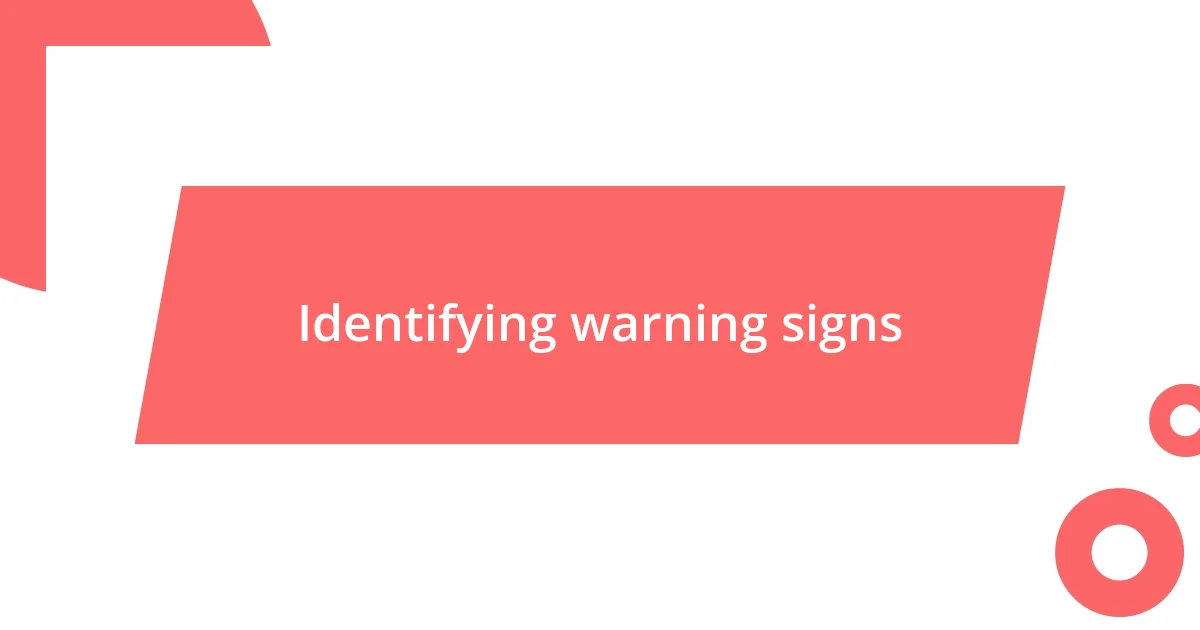
Identifying warning signs
Identifying warning signs in the world of crypto scams can be tricky, but experience has taught me to look out for specific cues. The other day, I overheard someone excitedly discussing an investment with astronomical returns—something that made my gut instinctively twist. Reflecting on my own journey, I realized how often people ignore the obvious when they’re caught up in the thrill of potential gains.
Here are some common warning signs to be vigilant about:
- Unrealistic Promises: If it sounds too good to be true, it probably is.
- High-Pressure Tactics: Scammers often push for immediate commitment—don’t succumb to that pressure.
- Lack of Transparency: If you can’t find clear information on the project or its team, proceed with caution.
- Poor Grammar and Spelling: Many scam communications are riddled with typos; this can be a red flag.
- Unverified Testimonials: If the success stories seem exaggerated or are hard to verify, trust your instincts.
I recall a moment that resonated deeply with me when a well-spoken influencer promoted a dubious project without clear evidence. The excitement in the air was palpable, and I could see how easily someone could overlook the subtle inconsistencies. I felt a mixture of sadness and relief knowing that keeping my skepticism alive served me well. Trust your intuition and educate yourself; they can be your best allies in spotting these pitfalls.
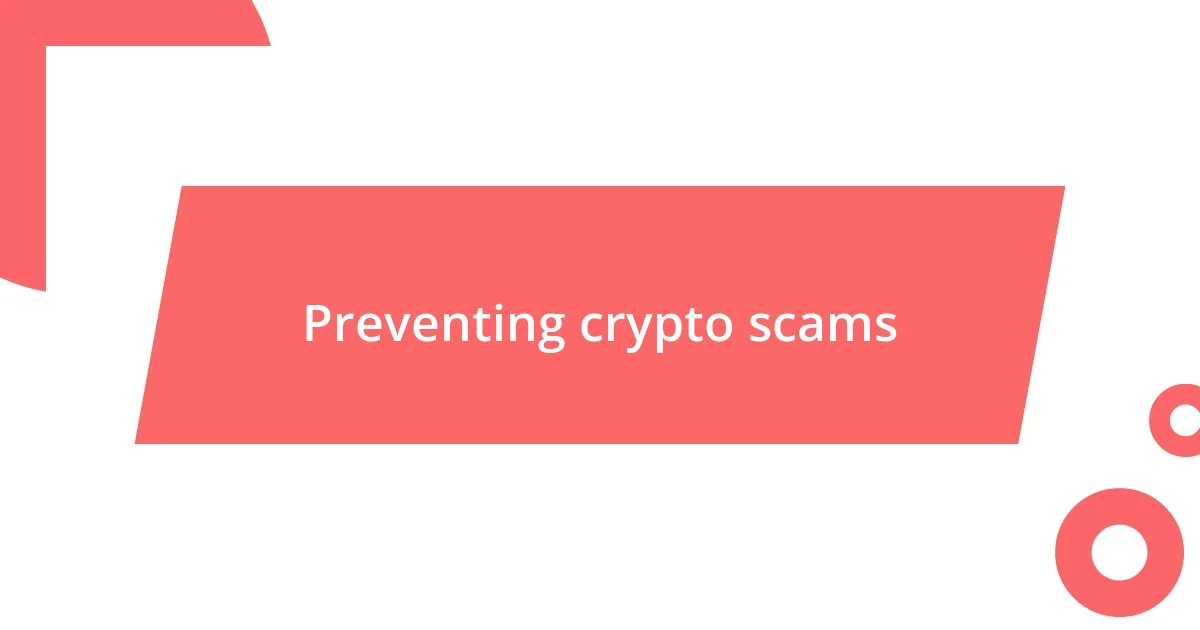
Preventing crypto scams
When it comes to preventing crypto scams, staying informed is crucial. I remember the first time I nudged a friend away from a flashy investment. We were at dinner, and he was visibly excited about a “can’t-miss” opportunity. I asked him to take a step back and consider whether he actually understood the project. It was a small moment, but it reminded me how crucial it is to question what’s presented to us, just because it sounds convincing.
Another key strategy is to use two-factor authentication (2FA). I still remember the feeling of anxiety after hearing about a friend who lost access to their wallet because they neglected this simple step. It was a wake-up call for me. Secure your accounts with extra layers of protection. Having that peace of mind makes it easier to focus on legitimate investments rather than worrying about what could go wrong.
Finally, engaging with reputable communities can significantly reduce the risk of falling prey to scams. There’s a certain comfort in sharing experiences with others who are just as passionate about crypto. I once joined an online forum primarily for support and advice, where we discussed potential red flags in various projects. The shared insights had a tangible impact on my decision-making, proving that collaboration and dialogue in the crypto space can be powerful tools against deception. After all, isn’t it better to learn from others’ mistakes than to make them yourself?
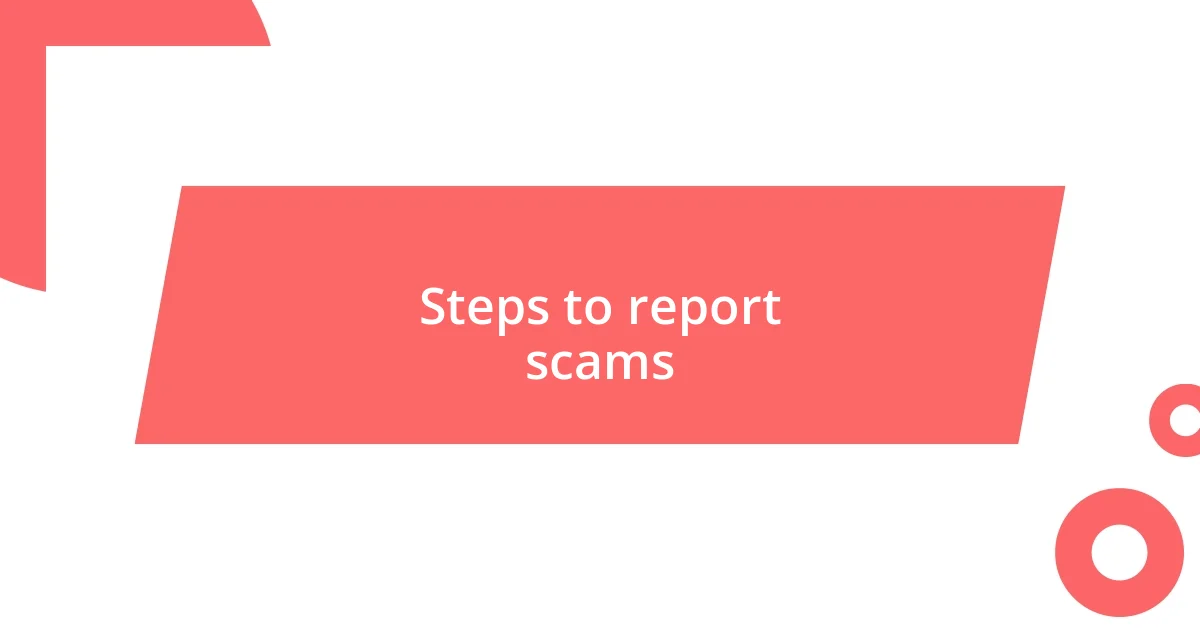
Steps to report scams
It’s crucial to know how to report scams if you ever find yourself a victim or witness one. I vividly recall the moment I discovered a particularly sneaky scam targeting unsuspecting investors in my circle. Feeling a sense of urgency, I quickly gathered evidence. Screenshots of communications, links to fraudulent sites, and any relevant messages from the scammers were all essential. Keeping thorough records made the reporting process smoother and more compelling.
Once I had my evidence, I reported the scam to the platform where I encountered it, whether it was a social media site or a cryptocurrency exchange. Each platform often has its own reporting mechanism, and I found that utilizing these channels was vital for spreading awareness. I still remember the relief when I heard back from the support team, as their prompt actions helped prevent further scams targeting other individuals. Have you ever considered how important it is for these companies to be aware of scams? Your report could save someone else from a financial hit.
Additionally, I also reached out to local law enforcement and consumer protection agencies. It’s a step that many overlook, but I discovered that these organizations often have dedicated departments for financial fraud. The look of understanding and support from the officer I spoke with reassured me that I wasn’t alone in this battle. Reporting to multiple channels enhances the chances for action and helps build a stronger case. Have you thought about how your voice can contribute to a larger cause? Every report can play a part in reducing the prevalence of these scams.
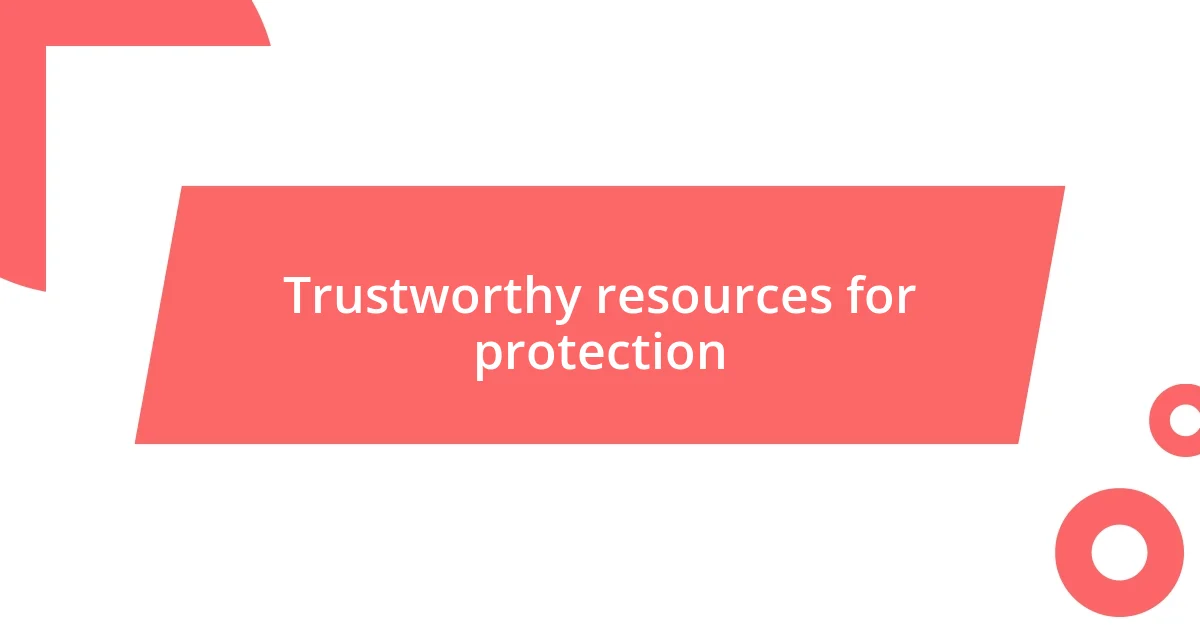
Trustworthy resources for protection
To effectively safeguard against crypto scams, I have found a few reliable resources invaluable. First, the Federal Trade Commission (FTC) offers a wealth of information on recognizing and reporting scams. I remember getting lost in their guidelines one evening and feeling empowered by the clarity they provided. Their easily digestible articles break down complex topics, making them approachable even for those new to crypto.
Another excellent resource is the website of the Better Business Bureau (BBB). Whenever I need to vet a new investment platform, it’s my go-to place for checking their history. I vividly recall a time when I was drawn toward a platform that seemed legit, but a quick BBB search uncovered numerous complaints. That simple act saved me from a potential loss, proving that utilizing trustworthy resources can make all the difference.
Lastly, don’t underestimate the power of community knowledge. I’ve had experiences where asking questions in forums and social media groups led me to discover critical information about scams that weren’t widely reported. The communal aspect of sharing experiences feels like having a safety net—how reassuring is it to know you’re not navigating these tricky waters alone? Leveraging trustworthy resources not only equips you better; it also helps build a sense of camaraderie in a space that can often feel intimidating.
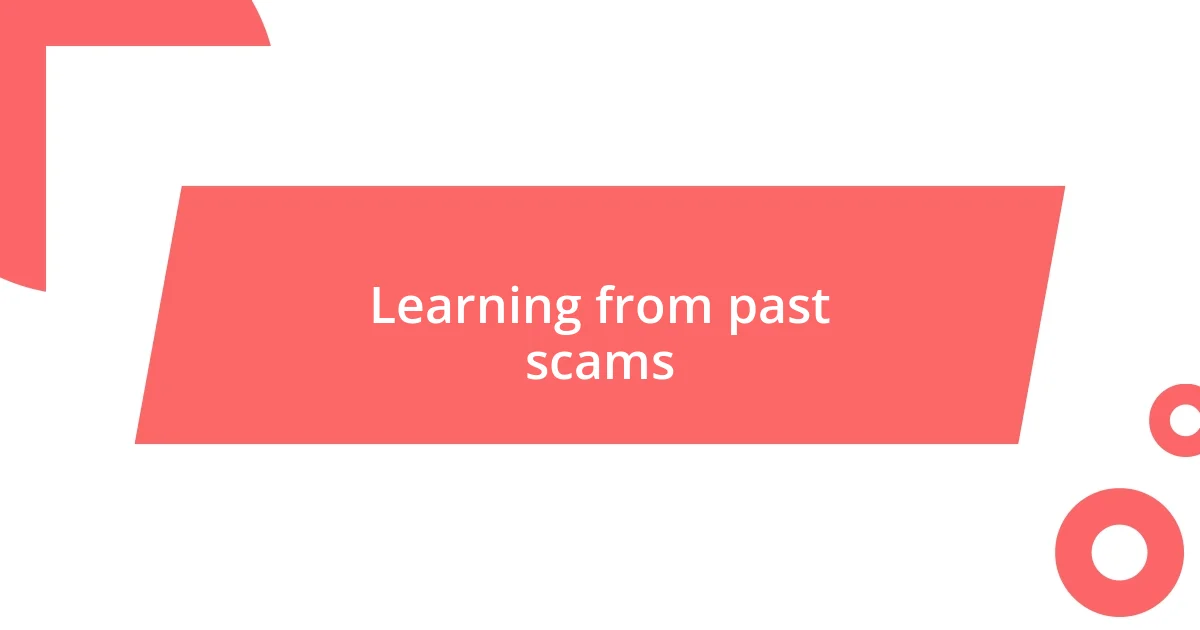
Learning from past scams
Looking back on the crypto scams that have plagued the community, I’ve seen firsthand how important it is to learn from the mistakes of others. There was a case I read about where a well-known influencer promoted a project that turned out to be a complete sham. Many people lost significant amounts of money because they trusted that recommendation without doing their own due diligence. Have you ever felt that urge to jump on a trending investment? It’s a lesson that echoes in my mind: always research, even when something appears to be endorsed by someone you admire.
I recall attending a seminar where a victim shared her experience with a Ponzi scheme disguised as a cryptocurrency investment. Hearing her recount the emotional toll it took on her and her family was gut-wrenching. It highlighted just how devastating these scams can be, not just financially but emotionally as well. It made me realize that awareness and vigilance are key. When we openly discuss these stories, we empower each other and create an environment where scammers can’t thrive. What if we all shared our experiences more? It could turn our collective pain into a powerful tool for protection.
Reflecting on past scams reminds me to trust my instincts. Once, I encountered a project that promised guaranteed returns—something inside me screamed “too good to be true!” I decided to dig deeper and was shocked by the web of deceit I uncovered. This experience reinforced my belief that skepticism is healthy in the crypto world. Are you cultivating that sense of caution in your journey? Learning from these past incidents not only protects us but also strengthens our resolve to challenge deceitful practices moving forward.












